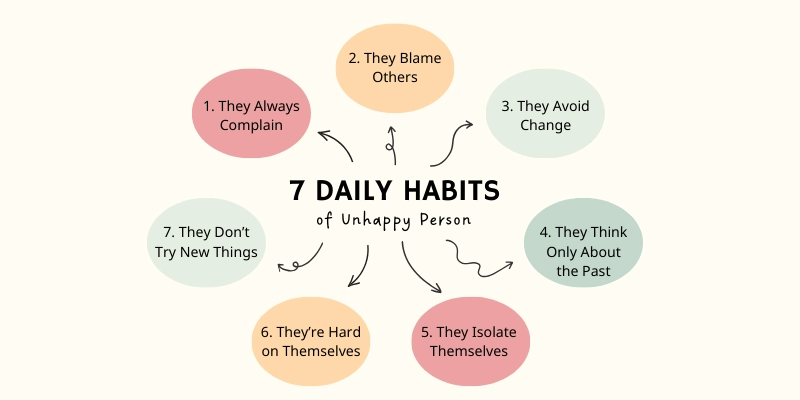How to Break 7 Habits of an Unhappy Person and Start Living Happier
Published: 27 Sep 2025
Have you ever noticed someone who always seems unhappy, no matter what happens?
It’s easy to think they’re just unlucky or in difficult situations but the truth is that many unhappy people have habits that keep them stuck in that state.
In this article, we’ll look at the everyday habits of an unhappy person and how to use them to improve your life.

Understanding Unhappiness
Unhappiness isn’t only about being sad. It occurs when a person feels trapped in a challenging situation, unable to enjoy life and feel satisfied with it. It may last for a short period or become an ongoing issue.
Unhappiness isn’t caused by what’s going on around us. It’s more about how we feel and what we do. Some people are sad because they only see the bad things that happen or think they will never get better.
7 Habits of Highly Miserable People
Here are some habits that unhappy people often have and how you may change them.
1. They Always Complain
Miserable people spend a lot of time complaining about work, friends, and everything. No matter what’s going on, they find something in their life to feel sad about.
Example: Imagine a person who always complains about their job. Even when something good happens, they find a way to turn it into a complaint.
Why it’s a problem: Complaining keeps them concentrated on the negative. This habit makes them feel stuck and stops them from noticing the good things in life.
How to fix it: Try focusing on the good and positive things. Start each day by listing three things you’re grateful for.
2. They Blame Others
Miserable people often blame others for their difficulties rather than taking responsibility for their own actions. Their thoughts are: “If only this person did this another way, I’d be happy.”
Example: A person might blame their friend for not inviting them to a party, even though they didn’t make an effort to join in earlier.
Why it’s a problem: Blaming others gives them no control over their own happiness. They feel helpless and stuck.
How to fix it: Accept responsibility for your feelings. Consider what you can control and modify, such as your state of mind or how you respond to situations.
3. They Avoid Change
Unhappy people are afraid of change. Even when they’re sad, they attach to the same routine because it feels safe.
Example: A person might stay in a job they hate because it’s easier than looking for something better.
Why it’s a problem: Staying stuck in a bad situation keeps them from finding joy or change.
How to fix it: Try taking small steps toward change. Start by setting small and achievable goals. Change can be scary but with time it becomes easier.
4. They Think Only About the Past
Sad people often get stuck thinking about things that went wrong in the past. They stay on mistakes and regrets.
Example: Someone might recall a discussion in which they said something they regret, making them feel miserable over and over again.
Why it’s a problem: Thinking about the past stops them from enjoying the present moments. It’s like carrying a heavy bag filled with old things.
How to fix it: Practice living in the moment. When your mind drifts to the past, gently remind yourself to focus on the present. You can try mindfulness or deep breathing exercises.
5. They Isolate Themselves
Miserable people often motivate extras away. They believe no one will understand their issues, so they isolate themselves.
Example: People can reject proposals to social gatherings because they believe no one cares about them.
Why it’s a concern: Isolation leads to loneliness. It makes their problems seem bigger than they are and keeps them from feeling supported.
How to fix it: Consider making an effort to communicate with someone every day. Even a short chat with a buddy can have a significant impact. People care more than you realize.
6. They’re Hard on Themselves
Depressed people often criticize themselves. They think they’re not good enough or smart enough to do anything in life.
Example: Someone might fail a test and think, “I’m just dumb. I’ll never get this right.”
Why it’s a problem: Self-criticism destroys their confidence and makes them unhappy.
How to fix it: Be kind to yourself. Replace negative thoughts with positive affirmations. Instead of saying, “I can’t do this,” try saying, “I’m learning and improving every day.”
7. They Don’t Try New Things
People who are miserable often avoid trying new things. They stay in their comfort zones, even when it’s boring and unfulfilling.
Example: Someone might refuse to try a new hobby because they’re afraid of failing.
Why it’s a problem: Sticking to what’s comfortable makes life boring and unexciting. It stops growth and new experiences.
How to fix it: Step out of your comfort zone. Try something new every week, even if it’s small. New experiences bring joy and open doors to personal growth.
Breaking the Cycle of Unhappiness for Better Mental Health
These habits have a significant influence on your mental health, but the good news is that you don’t have to stop living with them. Recognizing the habits that contribute to your unhappiness is the first step in breaking the cycle of unhappiness.
Here are a few simple tips to overcome the habits of unhappy person:
- Practice Gratitude: Start by focusing on the positive aspects of your life. Every day, make a list of three things you are happy with. This exercise helps to divert your focus away from unpleasant thoughts.
- Face Your Fears: Gradually try things that make you uncomfortable. Small steps can help you build confidence and reduce anxiety.
- Let Go of Perfection: Remember that it’s okay to make mistakes. Aim for progress in your work, not perfection. This habit helps reduce stress and allows you to enjoy the journey.
- Stop Blaming: Take responsibility for your actions and feelings. This action helps you recover control and feel empowered to change your situation.
- Connect with Others: Reach out to friends or family for a small conversation. Social connections can help reduce feelings of loneliness and increase happiness.
Conclusion
Breaking free from habits that keep you unhappy isn’t easy but it’s possible. When you identify the habits that are holding you back such as comparing yourself to others, avoiding fear, or blaming others, you can begin to make meaningful changes in your life.
It’s time to take that first step. It doesn’t matter if you overcome a bad habit or try something new, every good change brings you closer to a happy life. What’s one small step you can take today to begin your journey toward a happier life? Take that step and watch how it leads to better changes.

- Be Respectful
- Stay Relevant
- Stay Positive
- True Feedback
- Encourage Discussion
- Avoid Spamming
- No Fake News
- Don't Copy-Paste
- No Personal Attacks

- Be Respectful
- Stay Relevant
- Stay Positive
- True Feedback
- Encourage Discussion
- Avoid Spamming
- No Fake News
- Don't Copy-Paste
- No Personal Attacks





